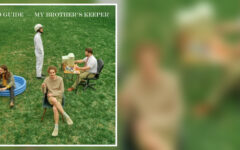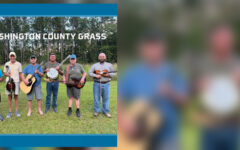
 This review of An Evening In The Village: The Music of Béla Bartók is a contribution from David Hollender, Professor at the Berklee College of Music. Hollender teaches individual banjo lessons at Berklee, and leads a number of ensembles.
This review of An Evening In The Village: The Music of Béla Bartók is a contribution from David Hollender, Professor at the Berklee College of Music. Hollender teaches individual banjo lessons at Berklee, and leads a number of ensembles.
The cover of Jake Schepps’ new CD features a famous quote from Béla Bartók:
“Folk melodies are the embodiment of an artistic perfection of the highest order; in fact, they are models of the way in which a musical idea can be expressed with utmost perfection in terms of brevity of form and simplicity of means.”
Bartók (1881-1945) was born in Hungary and was equally important as a 20th century classical composer and as one of the first ethnomusicologists. He devoted years traveling and collecting thousands of Hungarian, Slovakian, Romanian and Bulgarian folk songs. He later used those melodies and rhythms in his compositions. Bartók was not the first composer to use themes borrowed from folk music in classical compositions, but he differed from his predecessors in that he did not “fix” the music to make it conform to the rules of classical music. He allowed the tunes to retain their quirky elements and surprises.
Any number of banjo players have included arrangements of classical music but this project is the first to explore music composed by a single composer, and a 20th composer at that! The CD is co-produced by Schepps, Jayme Stone and mandolinist Matt Flinner, who is also plays and is credited with one of the arrangements. The band consists of Ross Martin and Grant Gordy taking turns on guitar; Ben Sollee (Sparrow Quartet) on cello; Eric Thorin, Greg Garrison (Punch Brothers) and Ian Hutchinson on bass. Violinist Ryan Drickey is a kind of hinge pin in the ensemble in that his ability to play both convincing fiddle and classical violin give the sound credibility as the music shifts between styles. While all players turn in excellent performances the real focus of this project is the compositions and the ensemble.
Before anybody hears 20th century classical music and proclaims, “Modern classical music just sounds like noise!” hang on a minute. Forget about labels. This music is actually based on old time music not the least bit unlike tunes you have heard adapted to bluegrass. Schepps chose nine of Bartok’s 44 Violin Duos, several selections from Mikrokosmos (piano music), and excerpts from some larger orchestral pieces for this band, all of which have strong connection to folk music. Some tracks are basically transcriptions of music written for two violins. Those tracks are good but the real excitement comes when band picks up where Bartok Bartók left off and uses his writing as a platform to which they add vamps, rhythmic and melodic counterpoint and chords and build in sections for improvised solos. The title track, Evening in the Village, Play Song, Mikrokosmos #153 and Stick Game stand out.
The CD also includes a single tune that deserves mention. Cousin Sally Brown is not by Bartók. It is an American fiddle tune. What is interesting is how much it has in common with the Eastern European tunes. It drives home the point that American and Eastern European folk music have more things in common than the number of things that divide them.
It is easy to find examples of musicians trying to blend classical music with other styles, only to disastrous effect. In this case the effort is not just successful; it is perfectly logical since it is simply carrying what Bartók did a step further.
The field recordings of peasants in small European villages singing the old songs have been transferred to digital forms and archived. Hearing them side-by-side with the Bartok and Schepps versions is the best way to hear the connections and appreciate the innovations. If you hear this CD and like it you are encouraged to do that.
In the liner notes quote Schepps as saying, ”All kudos go Bartók, and not to me!” I appreciate that kind of humility, but still say kudos to Jake Schepps and all the players.







